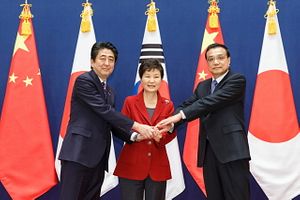After a three year hiatus, China, South Korea, and Japan resumed their trilateral summit at the end of 2015, which would seem a step forward in improving political and economic relations among the three countries as well as keeping peace and stability in Northeast Asia. However, problems between China and Japan will prevent further improvements. For the foreseeable future, China-Japan relations will probably remain lukewarm to cold rather than being truly friendly. Expect political zigzags ahead.
After three decades of its reform and opening-up policy, China’s comprehensive national power and international influence have risen enormously. It’s the right time for China to adjust its identity and diplomatic strategies. Therefore, the new Chinese government has proposed the “One Belt and One Road” initiative (OBOR), the top-level design for China’s foreign relations, which will consequently shape China’s foreign strategy in the coming years. From now on, China will again view itself as a central country in Asia writ large, as well as a main power on the Eurasian continent, instead of merely an East Asian country.
Based on that, China has obviously strengthened its diplomacy toward neighboring countries. Now China needs to discover which relationships have the most potential. It’s easy to see how most of China’s neighbors fit in to the OBOR plan. But what about Japan?
When it comes to Northeast Asia, South Korea has become China’s key sub-regional partner. In contrast, China-Japan relations are no longer as important as they were in the 1980s and 1990s when Japan was a very important country – behind only the United States — for China. Japan now has fallen behind Russia, Kazakhstan, Pakistan, ASEAN, and South Korea on China’s diplomatic priority list. This situation will continue in the foreseeable future, thanks mostly to Japan’s own foreign policy.
Since assuming office in 2012, Prime Minister Shinzo Abe has taken several steps unacceptable to China, from stirring up historical issues by visiting Yasukuni Shrine to working to eliminate Article 9 of the Japanese Constitution, despite steep public opposition in Japan. Abe has also adopted a confrontational attitude on OBOR, meaning the Chinese government cannot expect Japan’s participation on Beijing’s top foreign policy priority. There are structural contradictions between OBOR and Japan’s current pursuit of “national normalization.” Lacking common strategic goals and therefore the necessary strategic mutual trust, it is impossible for China-Japan relations to truly warm up.
However, China and Japan won’t witness the reduction of economic ties, which would be obviously harmful for both. Both sides will try to keep their economic relations stable. When political relations affect economic ties, China and Japan may take action to warm things up, as we saw with the “four point consensus” reached on November 7, 2014, followed by two meetings between Xi Jinping and Abe in the following six months. But these temporary fixes won’t really cure the disease of bilateral relations; the situation probably won’t change until Abe finishes his term. In other words, don’t expect major progress (like the completion of a China-Japan-South Korea free trade agreement) during the Abe administration.
What can two sides do, then? If strategic cooperation isn’t a possibility, they could try to promote functional cooperation in specific fields. Japan would benefit from cooperating with China on technologies like unmanned aerial vehicles (UAV), high-speed rail equipment, communication standards, and so on. Meanwhile, Japan still has comparative advantages in fields such as energy conservation and emission reductions, urban public transportation management, and waste management.
Japan and China could also try to cooperate in third countries. For example, they might cooperate in infrastructure construction in the Indochinese Peninsula, which could indirectly bring Japan into the OBOR initiative.
Dr. Xue Li is Director of the Department of International Strategy at the Institute of World Economics and Politics, Chinese Academy of Social Sciences. Zheng Yuwen is a master’s degree student at China Foreign Affairs University.

































